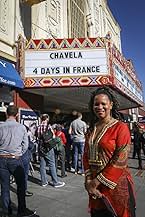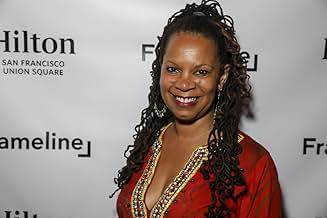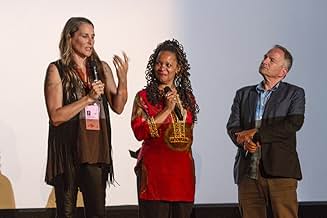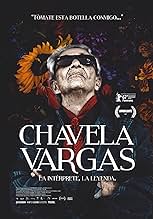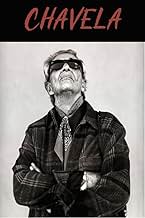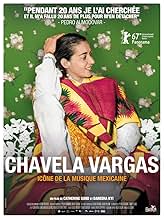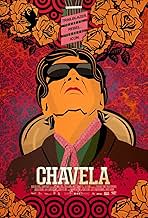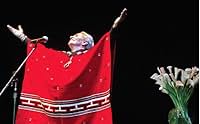IMDb RATING
7.7/10
1.2K
YOUR RATING
The life of pioneering singer Chavela Vargas, from her birth in Costa Rica in 1919 to her death in Mexico in 2012.The life of pioneering singer Chavela Vargas, from her birth in Costa Rica in 1919 to her death in Mexico in 2012.The life of pioneering singer Chavela Vargas, from her birth in Costa Rica in 1919 to her death in Mexico in 2012.
- Awards
- 6 wins & 7 nominations
Laura García Lorca
- Self
- (as Laura García-Lorca)
Storyline
Did you know
Featured review
Born in Costa Rica and having lived most of her life in Mexico, singer Chavela Vargas was a pioneer on many respects. Born in 1919, she became famous in the 1950s but her career was interrupted and she was forgotten two decades later to the point that many people believed her to be dead. Her comeback around the age of 70 was one of the most remarkable in the history of music, so was her presence in the public awareness, both for her music and for attitude. The film Chavela co-directed by Catherine Gund and Daresha Kyi with the participation of Pedro Almodóvar is part of a spectacular comeback of an artist whose life is still surrounded by mysteries six years after her death.
Chavela Vargas was a very non-conventional woman and artist who built her career and lived much of her life in a conservative country. She sang the music of the Mexican cowboys ('rancheras') and dressed unconventionally. It was only very late in her life and career that she could go public as a lesbian, but her sexual orientation as well as the alcohol addiction were the principal causes of her fall of the grace of the public at the peak of her career, despite her success and popularity. Audiences simply believed that she is no longer alive, but to everybody's surprise (including probably her own) she had the courage and power to make one of the most sensational comebacks in the history of music, enjoying again success, and becoming an international celebrity. She was older than 80 years when she made her debut in places like Carnegie Hall or Olympia, and her music was a source of inspiration for several films of Pedro Almodóvar.
The documentary spends quite little time dealing with her early career, focusing or her fall and comeback. It is based mostly on her own interviews and on testimonies from her friends and colleagues. There is a lot of material about her private life, less about her music. As in many musical documentaries music presented on screen (with very appropriate English translation of the lyrics) speaks best about her art, but for me, knowing close to nothing about Mexican or Latin American music of the 20th century, I found that there is too little material or none about her musical innovations and why she was different and better than most of the other musicians of her generation. It's more a documentary about an exceptional life than about an exceptional musician.
Chavela Vargas was a very non-conventional woman and artist who built her career and lived much of her life in a conservative country. She sang the music of the Mexican cowboys ('rancheras') and dressed unconventionally. It was only very late in her life and career that she could go public as a lesbian, but her sexual orientation as well as the alcohol addiction were the principal causes of her fall of the grace of the public at the peak of her career, despite her success and popularity. Audiences simply believed that she is no longer alive, but to everybody's surprise (including probably her own) she had the courage and power to make one of the most sensational comebacks in the history of music, enjoying again success, and becoming an international celebrity. She was older than 80 years when she made her debut in places like Carnegie Hall or Olympia, and her music was a source of inspiration for several films of Pedro Almodóvar.
The documentary spends quite little time dealing with her early career, focusing or her fall and comeback. It is based mostly on her own interviews and on testimonies from her friends and colleagues. There is a lot of material about her private life, less about her music. As in many musical documentaries music presented on screen (with very appropriate English translation of the lyrics) speaks best about her art, but for me, knowing close to nothing about Mexican or Latin American music of the 20th century, I found that there is too little material or none about her musical innovations and why she was different and better than most of the other musicians of her generation. It's more a documentary about an exceptional life than about an exceptional musician.
- How long is Chavela?Powered by Alexa
Details
- Release date
- Countries of origin
- Official site
- Languages
- Also known as
- Amor Puro y Duro: Love Hard & Pure
- Filming locations
- Mexico City, Distrito Federal, Mexico(interior and exterior locations)
- Production company
- See more company credits at IMDbPro
Box office
- Gross US & Canada
- $148,666
- Opening weekend US & Canada
- $22,453
- Oct 8, 2017
- Gross worldwide
- $272,842
- Runtime1 hour 33 minutes
- Color
Contribute to this page
Suggest an edit or add missing content





